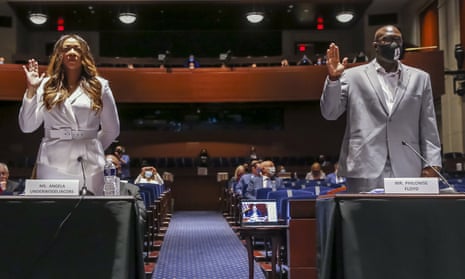The sister of a security officer who was murdered in Oakland in 2020 is suing Facebook, alleging that the tech company played a part in radicalizing the two men accused of killing him.
David Patrick Underwood was fatally shot and his partner was wounded while guarding a federal building on 29 May 2020, when a large demonstration over the police killing of George Floyd was underway nearby.
Federal prosecutors said two men now awaiting trial in the drive-by shooting met through a Facebook group page dedicated to the extremist anti-government “boogaloo” movement and used the protest as cover for the crime.
The wrongful death lawsuit against Meta, Facebook’s parent company, was filed Thursday in Alameda county superior court. It seeks at least $25,000 in damages.
“Facebook bears responsibility for the murder of my brother. As the lawsuit alleges, Facebook knowingly promoted inflammatory and violent content and connected extremists who plotted and carried out the killing of my brother,” Angela Underwood Jacobs said in a statement.
The lawsuit alleges that Facebook used algorithms to steer users to extremist groups as a way to keep them active on the platform, which in turn drives advertising sales and revenue.
“We believe and intend to show that Facebook’s conduct has led to a rise in extremism throughout the world and acts of real-world violence, including the murder of officer Underwood,” the sister’s attorney, Ted Leopold, said. “It is time that Facebook is finally held accountable for its actions.”
Federal prosecutors have said Steven Carrillo, an Air Force sergeant, met his accomplice Robert Alvin Justus Jr through a Facebook boogaloo group, where they agreed to take advantage of the racial justice protests to attack law enforcement officers. Messages obtained by investigators show the men agreed to meet in person and drive to the Oakland protest, where prosecutors said Carrillo fired at Underwood and his partner with a homemade assault rifle before fleeing.
The Guardian reported in 2021 that researchers monitoring online extremism had feared an attack like the one that killed Underwood, after they identified boogaloo groups on Facebook with thousands of members. These groups were used to recruit new members, sharing advice for making weapons and post memes about killing police and federal officials. Facebook said at the time that it took action against hundreds of individual posts that violated its policies against inciting violence but did not ban the boogaloo movement from its platform.
Carrillo was arrested eight days later, after he shot and killed a Santa Cruz sheriff’s sergeant and wounded four other officers who tracked down his vehicle. Carrillo has pleaded not guilty to both killings. Court documents reveal Carrillo also had ties to a rightwing militia known as the Grizzly Scouts that held firearms trainings, scouted protests and laid out terms of “war” against police.
After Underwood’s killing, Facebook pledged to remove groups, accounts and pages affiliated with the far-right group from its services. But the lawsuit alleges groups tied to the boogaloo movement persist on the platform.
“We’ve banned more than 1,000 militarized social movements from our platform and work closely with experts to address the broader issue of internet radicalization. These claims are without legal basis,” said Kevin McAlister, a spokesperson for Meta.
